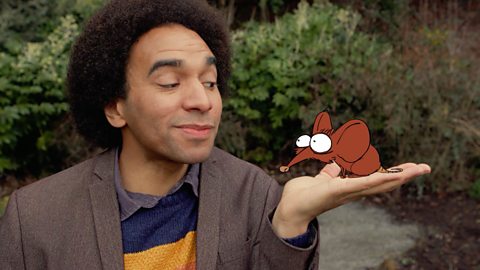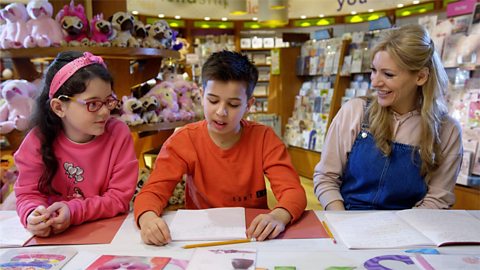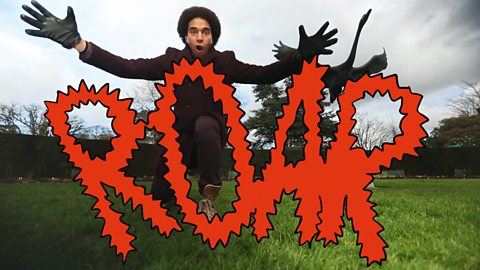Below you will find a range of poems to explore with your class. Together you can read, discuss and appreciate the poems, and maybe even learn some by heart to perform as individuals or as a class.
The poems are arranged by age-group with three for 5-7 year-olds, three for 7-9 year-olds and three for 9-11 year-olds.
Each poem has a transcript below the video, so you can see the words and read along in class.
Poems for 5-7 year-olds
Joshua Seigal recites his poem, Out In The Playground.
Out in the playground on a summer’s day, look at all the children as they leap and play.
Licking luscious lollies in the hazy heat, listen to the pounding of their stamping feet.
Out in the playground with the smiling sun, we dangle on the monkey bars and have a lot of fun.
We feel the shiny metal as our hands grip tight.
We plummet to the asphalt and our legs take flight.
Out in the playground with its shrieks and noise, catch the cool kaleidoscope of parents, girls and boys.
Hold your breath and count to one, two, three, then dash away like lightning:
You can’t catch me!
Sophia Thakur recites her poem, Coming From Inside My Mouth.
Knock knock knock from inside my mouth, there’s something that reeeeeally wants to come out.
Knock knock knock I feel behind my lips, maybe I’ll open them but only a bit.
Knock knock knock that’s it! I was trying to sleep.
But something so desperately wants to speak.
So I sit up in my bed, I straighten my head, and prepare for whatever is so eager to be said.
I take a deep breath, and shut both my eyes, and then open one in case of any surprise.
I loosen my jaw and lift up my tongue, and slowly pull apart my lips.
But as soon as they open the tiniest bit the words come pouring out in a fit.
Wake up Sophia! You’re late for school!
Sophia Thakur tell pupils about her poem, Coming From Inside My Mouth.
Hi, I'm Sophia Thakur, I'm a poet.
This poem is about having something you really want to say, and you just don't really know how. It can be a secret, it can be something that you're really passionate about or you really love. And you just feel maybe too scared or too shy to say it. This poem's about why you should just say it, otherwise it will keep knocking.
My favourite line in the poem is, 'I loosen my jaw and lift up my tongue.' Because I think, when we do loosen our jaw and open our mouth and lift up our tongue, we give our heart a chance to say what it feels instead of keeping it tucked away.
My favourite word in the poem is, 'speak' because it's all we can do to each other, and I think we should all speak to each other.
I really enjoy performing my work; I feel like it lifts the poetry off just the page and gives it a whole body to express itself in.
Poems for 7-9 year-olds
Joshua Seigal recites his poem, National Champion Athlete.
I’m a National Champion Athlete.
My medals shine bright on my chest.
I’ve a medal for bolting my dinner.
At chatting in class I’m the best.
I’m the winner when chasing my sister.
At hogging the couch I got gold.
I’ve a medal for reading past bedtime.
I’m the champ at not doing what I’m told.
I’m the victor when splashing in puddles.
I’ve won prizes for spilling my drink.
When trying to outwit my tabby, I defeated the beast in a blink.
I’ve a medal for hanging on railings.
I’m the top dog when rolling down hills.
With excuses for not doing homework, my prowess gives rivals the chills.
One day you’ll see me on the telly with medals that glisten and gleam.
I’m a National Champion Athlete, and my best friends and I - we’re a team.
Sophia Thakur recites her poem, My Mind This Time.
I would love to pay a visit
But it seems my legs are missing so instead I’ll make a vision
Open the door and take a trip in - to
My mind this time
I wonder what I will find behind my thoughts
Where everything rhymes and everything floats
And musical notes
Surf the sky like birds
And land in our homes knock knock knock
A song sits on the step
I pull open the door
And away I am swept
Into the clouds
It’s oh so loud
I open my mouth
And this voice comes out
It feels like mine
But sounds so much better perhaps we all sound better when we're singing closer to heaven
I would love to pay a visit
But it seems my legs are missing so instead I’ll make a vision
Open the door and take a trip in - to
A book this time
I’ll slide between some lines
Wrap myself in the pages
Until our lives intertwine
I’ll go and save the princess
I’ll fight and slay the dragon
I’ll become so much faster
And braver than you can ever imagine. Whooooosh
As I fly around the city
With the words from the book travelling with me
But oh no…
It seems as though I’m falling
I’m slipping from the page
The author says I must return with something of my own to say.
Sophia Thakur tell pupils about her poem, My Mind This Time.
Hi, my name is Sophia Thakur and I am a spoken word artist and poet.
The main emotion behind this poem is imagination, and how it takes us from our reality and then brings us back to our reality, and informs it and enriches it. I guess the meaning behind it is allowing our thoughts to run wild and then coming to see our real life with a new lens of creativity and excitement.
I think my favourite line in this poem is, 'So instead I'll make a vision'. Because I find myself escaping from reality, even if it's just in my head, all the time, twenty-four seven, whether it's a long car journey, whether it's a train journey, whether it's when my mum's lecturing me. I just disappear into my own dreamscape. So, I think that's probably my favourite line 'cos it feels most like me.
I think my favourite word in the poem is probably in that line, it's 'vision'. I think vision guides everything we do, our perspective shapes everything around us - how we engage with the world around us, how we engage with the people around us. So probably 'vision'.
Actions really help with performance because one, it helps you remember poems, when you link an action to a word you're more likely to remember it because of how your cognitive brain digests and remembers things. And also, it kind of, the words are fifty percent of the performance and then how you move your body or your face or even just your tone or your volume, they all play a massive part in how the message is communicated. I think seventy percent of human communication is non-verbal.
Rhythm is really important in poetry because I guess that's what differentiates a normal piece of writing on a page and a poem. I think when you can add in rhyme and flow, you let the listener sink into the performance of the thing and they kind of go with you. It also makes it easier to remember things when you put them in rhyme and I think it's a fun way of telling a story as well.
The feeling of performing your own work in front of people is so priceless. I think a lot of performance poets will agree that, when they step onto stage and they become this person, it's when they feel most like themself. It's kind of giving life or giving an adventure to the poem that you've probably written in your bedroom or somewhere quite isolated, and then suddenly you get to give it wings to see how it lands on people's faces, in people's reactions, in how they react afterwards and how it makes them feel so, I think it is kind of giving that pulse back to the poem when you perform it.
Poems for 9-11 year-olds
Joshua Seigal recites his poem, When I Close My Eyes.
As I stifle a yawn
I can see winter trees swaying silently
outside the classroom window.
I close my eyes
and I’m an explorer, hacking my way
through tangled vines
in the frantic jungle of my mind.
Inside the classroom
Miss Ellis is prowling slowly
as she moves from desk to desk.
I close my eyes
and I’m a soldier on a battlefield,
dodging and ducking
as the cannons boom.
Down in front of me
I see sheets of sums that my tired brain
struggles to understand.
I close my eyes
and I’m a skydiver, twisting
and tumbling into the mouth
of a vicious volcano.
All around me
serried classmates sit quietly
with pencils in their patient hands.
I close my eyes
and summon demons and dragons
from faraway
magical
mystical lands.
Ben Faulks recites Jabberwocky by Lewis Carroll.
’Twas brillig, and the slithy toves
Did gyre and gimble in the wabe:
All mimsy were the borogoves,
And the mome raths outgrabe.
“Beware the Jabberwock, my son!
The jaws that bite, the claws that catch!
Beware the Jubjub bird, and shun
The frumious Bandersnatch!”
He took his vorpal sword in hand;
Long time the manxome foe he sought—
So rested he by the Tumtum tree
And stood awhile in thought.
And, as in uffish thought he stood,
The Jabberwock, with eyes of flame,
Came whiffling through the tulgey wood,
And burbled as it came!
One, two! One, two! And through and through
The vorpal blade went snicker-snack!
He left it dead, and with its head
He went galumphing back.
“And hast thou slain the Jabberwock?
Come to my arms, my beamish boy!
O frabjous day! Callooh! Callay!”
He chortled in his joy.
’Twas brillig, and the slithy toves
Did gyre and gimble in the wabe:
All mimsy were the borogoves,
And the mome raths outgrabe.
Ben Faulks recites part of The Tempest by William Shakespeare.
Ye elves of hills, brooks, standing lakes and groves,
And ye that on the sands with printless foot
Do chase the ebbing Neptune and do fly him
When he comes back; you demi-puppets that
By moonshine do the green sour ringlets make,
Whereof the ewe not bites, and you whose pastime
Is to make midnight mushrooms, that rejoice
To hear the solemn curfew; by whose aid,
Weak masters though ye be, I have bedimm'd
The noontide sun, call'd forth the mutinous winds,
And 'twixt the green sea and the azured vault
Set roaring war: to the dread rattling thunder
Have I given fire and rifted Jove's stout oak
With his own bolt; the strong-based promontory
Have I made shake and by the spurs pluck'd up
The pine and cedar: graves at my command
Have waked their sleepers, oped, and let 'em forth
By my so potent art. But this rough magic
I here abjure, and, when I have required
Some heavenly music, which even now I do,
To work mine end upon their senses that
This airy charm is for, I'll break my staff,
Bury it certain fathoms in the earth,
And deeper than did ever plummet sound
I'll drown my book.
More primary poetry resources from BBC Teach:
Understanding Poetry with Joseph Coelho. collection
A series of short films for primary schools with poet Joseph Coelho, who explains how poetry is relatable, fun, and achievable and can open up new ways of understanding and expressing emotions and thoughts.

Write a poem. video
In this short film for primary schools, Naomi Wilkinson and a group of children are challenged to write a poem for someone they know.

Watch again: Writing and performance poetry - Live Lesson. video
Catch up with our Live Lesson to mark National Poetry Day, featuring poets Joseph Coelho and Tony Walsh.
